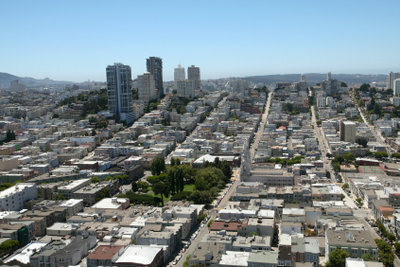"Modern Landscape" by Uwe Gressmann
Uwe Gressmann's life was short. In 1969 it came to an end again after only 36 years. He had only published one book during his lifetime. He could prepare another one before he died. Nevertheless, it has become significant. "Modern Landscape" is one of those expressionic poems that aim not only at modernism itself, but also at its mental attitude.

What you need:
- Original text
The nouns in "modern landscape"
Modern landscape (by Uwe Gressmann)
Steel trees grow on the sidewalks
And the wires branch out
from tree to tree
Roar underneath
"You are standing on Potsdamer Platz distraught and think Berlin is too loud." With these words …
The electric animals
Passed by with people in the heart
And so many pass by there
And doesn't find anything else there;
Because the stone landscape
Is his mother too
- In this poem, find the nouns first. These are "wires", "tree", "animals", "people", "hearts", "landscape", "mother". If you add the title "Modern Landscape" to the poem, all but three words have nothing to do with "Modern". But with "landscape". A landscape in itself is not modern, it is there. It only becomes a landscape through people's perception and can also be changed through them.
- Now, by definition, modernity is man-made. So when we speak of "modern landscape" we are talking about a man-made landscape. So there is an obvious difference between the landscape itself and the man-made landscape. And this is what the poem is aiming at. So when Uwe Gressmann describes a modern landscape and all but two nouns in one Landscape in itself can be localized, so you can assume that they are metaphors acts.
- By introducing metaphors from the landscape itself into the description of a modern landscape, he makes the two comparable. Man looks at the landscape itself and deals with the landscape itself. It is also he who creates the modern landscape. He is the bridge. The image is broken up by the wires.
Uwe Gressmann as a poet and painter
- Uwe Gressmann is a painter in this poem. The reader looks with him at the landscape he describes. There are trees, animals with hearts and mothers. And yet it is modern. It is man-made, it is stone, it is a city. In his work, Gressmann describes the urban jungle that lives and trembles, gives birth and lets pass. People hurry, they are casual and only appear in the landscape.
- They become animals. Gressmann poses the question of human existence in the modern age and in doing so reveals a cultural criticism that was made clear in another field by the anthropologist Konrad Lorenz. In the opinion of the author, the fact that the poem was written in the GDR and thus under communism is also significant.
- This saw itself not only as revolutionary, but also as a permanent avant-garde, as a constant path towards (technical) progress. For Marx, too, technical progress initially means industrialization and then moves on to revolutionary socialization. The communists considered this to be fulfilled in their system, just think of the many VEBs (nationally owned enterprises).
- It is precisely this industrialization and mechanization, the urbanization of the landscape and thus the alienation of humans from the landscape itself and nature, that the poem aims at. It is not a social criticism, it is a criticism of a cold system that has produced socialized people who just "pass by" and feel nothing. After all, at some point it will also be a product of the city.
- After all, man is also made by his environment. Environment are living conditions, friends, relatives, needs and also the environment in which he grows up, to which he is used. If man knows nothing but the stone landscape, the city, industry, technical progress, then it is normal for man to become dull. He stops asking because it is familiar to him and it spawned him.
- In the end, it is the mother who creates the human being and when Uwe Gressmann describes the stone landscape as the mother of human beings, this is really the ultimate consequence. The complete turning away, the removal of man from nature is manifested here. The poem is thus not only a subversive act against a totalitarian regime, it is also Outcry against the man-made alienation of himself from nature, which he actually is listened to.
How helpful do you find this article?

